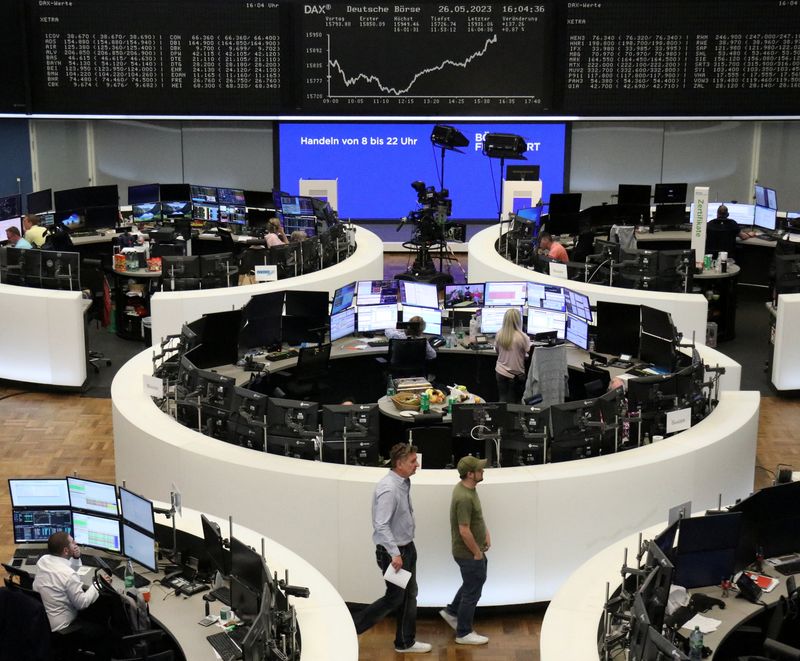By Elizabeth Howcroft
LONDON (Reuters) -European stock indexes edged lower on Monday and euro zone bond yields dropped, but news that the U.S. had reached a debt ceiling deal over the weekend kept Wall Street futures positive.
U.S. President Joe Biden and top congressional Republican Kevin McCarthy reached a tentative deal on Saturday to raise the federal government's $31.4 trillion debt ceiling, aiming to stop the U.S. from defaulting on its debt.
The deal is expected to provide only short-term relief for markets, as worries linger about inflation and further rate increases.
Asian stocks mostly rose, with Tokyo's Nikkei surging to a new 33-year high. But Chinese stocks fell after data showed profits slumping at China's industrial firms.
At 1346 GMT, the MSCI world equity index was up 0.1%. European stock indexes initially opened higher, then faltered, with Europe's STOXX 600 down 0.2% on the day.
But Wall Street futures rose, with S&P 500 e-minis up 0.2% and Nasdaq e-minis up 0.3%. U.S. and UK markets were closed for public holidays.
U.S. six-month credit default swaps narrowed, meaning that the cost of insuring against exposure to a U.S. debt default over the short term fell. But the five-year swap rose, suggesting some caution in markets about the deal.
The U.S. House Rules Committee said it will meet on Tuesday afternoon to discuss the debt ceiling bill, which needs to pass a divided Congress before June 5.
If the debt ceiling deal passes Congress, then market attention will return to the U.S. Federal Reserve's plans for rates, according to Samy Chaar, chief economist at Lombard Odier.
"Growth, particularly in the U.S., remains quite resilient. Inflation is pretty sticky," Chaar said.
"We’re back to the narrative where the Fed has to push harder to bring inflation down and that obviously is going to create some form of market anxiety because as you price rate hikes, rather than rate cuts, you put pressure on valuations."
Markets are leaning towards expecting the Fed to raise rates by 25 basis points next month, then keep rates steady for the rest of the year.
The Fed's preferred inflation gauge, the personal consumption expenditures price index, came in higher than expected on Friday and two-year U.S. yields hit their highest in more than two months after the data. Treasuries were not traded on Monday. U.S. Treasury note futures were up around 0.24% in a sign that U.S Treasury yields will fall when bond trading resumes.
Euro zone government bond yields were lower ahead of euro area inflation data due on Wednesday and Thursday. The benchmark 10-year German yield was down 10 basis points at 2.43%.
The U.S. dollar index was steady at 104.26, and the euro was down 0.2% at 1.07105. The dollar briefly hit a six-month high against the yen during Asian trading.

In Turkey, the lira hit a new record low against the dollar after President Tayyip Erdogan secured victory in a presidential election on Sunday, extending his increasingly authoritarian rule into a third decade.
Oil prices slipped, with Brent crude futures down 1% and U.S. West Texas Intermediate crude down 0.6%. Gold was little changed, hovering near Friday's two-month lows.
